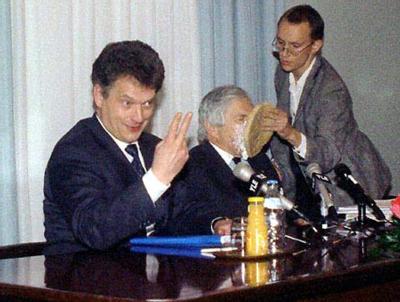Is it fair to have free trade that--by definition of economic theory--we know will cast countless people out of work without having a proper safety net in place?
Michael Triplett writes:
The Labor Department's program for providing
assistance to workers who lose their jobs because
of trade has come under fire from the federal court
that reviews the denial of claims, and says that
poor investigations and oversight are crippling the
program designed to approve re-employment
assistance.
In a series of blistering decisions, the U.S. Court
of International Trade has criticized the Labor
Department's Trade Adjustment Assistance program
for not properly completing investigations and
failing to adequately support denials of
assistance. Alleged problems with the program
escalated to the point that Judge Delissa Ridgway
suggested in a late December 2003 decision that
Congress should intervene to determine why the
program has gone astray.
Ridgway cited a "growing line of precedent"
involving the trade court ordering certification
after the Labor Department has rejected claims,
"evidencing a mounting frustration with the Labor
Department's handling of these cases," on the
court's part. "Clearly there is a message here.
Only time will tell whether the Labor Department,
and Congress, are listening," she said.
The criticism of the program comes as several
congressional Republicans and Democrats are calling
for more workers--including "knowledge workers" not
engaged in manufacturing--to be eligible for TAA
benefits because of outsourcing of jobs to foreign
countries.
A Labor Department official told BNA that the
court's criticisms had been heard at DOL and that
regulations were being drafted for the 2002 Trade
Act that would respond to some of the court's
concerns. The official, however, noted there was a
sense that the trade court focused some of its
comments on the "minutiae" of the program and that
the court was not in a position to "direct us on
how to manage the program."
The DOL official said that the department was
working to improve its explanation to potential
claimants of the process for making certifications
and to more fully describe the petition process so
claimants could provide more complete information.
Ridgway: DOL Needed Eight Reviews of Claim
It was Ridgway's decision in late 2003 approving
certification for former employees of Chevron that
encapsulated the trade court's increasing
frustration with the Labor Department. By the time
the case was decided in late December, Ridgway had
issued two other remand orders requiring the Labor
Department to do further investigations because it
had failed to substantiate its determination (See
related article in this section.)
After eight attempts to make a proper ruling on the
claims, the court finally approved the Labor
Department's certification, but only after
emphasizing that the certification was based on
information that DOL had in hand four years earlier
at the first step of the investigation.
"In a word, this case stands as a monument to the
flaws and dysfunctions in the Labor Department's
administration of the nation's trade adjustment
assistance laws--for, while it may be an extreme
case, it is regrettably not an isolated one,"
Ridgway wrote in Former Employees of Chevron Prods.
Co. v. Secretary of Labor, 298 F. Supp. 2d 1338
(Ct. Int'l Trade 2003); 6 DLR A-1, 1/12/04. "The
relatively high number of requests for voluntary
remands in trade adjustment assistance cases
appealed to this Court speaks volumes about the
calibre of the Labor Department's investigations in
general, and the Government's ability to defend
them."
In BNA's review of the 41 published opinions by the
court between 2001 and the present, the Labor
Department's denial of certification was affirmed
only five times, or in 12.5 percent of the cases.
In contrast, the court sent cases back 19 times so
the department could justify its holding or further
investigate the claim.
In 2003, when judges on the trade court increased
their criticism of the handling of trade claims,
the court issued 24 rulings in trade assistance
claims. Only two of them--both by Judge Nicholas
Tsoucalas--affirmed the department's denial of
certification.
In contrast, 14 decisions--or 58 percent of the
cases in 2003--involved remands back to the Labor
Department because the conclusions were unsupported
by the record or because the court found the agency
failed to properly investigate the claims. Eight
other remands were initiated by the Labor
Department, acknowledging it failed to fully
support the decision or investigate the claims.
During 2003, the court approved certification of
benefits five times. Three were affirmations of the
Labor Department's reversing itself and deciding to
grant certification after further review. Twice,
however, judges rejected the Labor Department's
investigation and granted certification despite
DOL's denial.
As of March 29, the trade court has issued only one
decision on TAA so far in 2004. In that case, the
court granted DOL's request for a voluntary remand
so that it could more fully investigate the
certification denial.
Judges Question DOL's Efforts
Although Ridgway has been the most outspoken critic
of the TAA program, her decisions are not the only
ones during 2003 that questioned how the Labor
Department was dealing with laid-off workers.
(Embedded image moved to file: pic02306.pcx)
Chief Judge Gregory W. Carman awarded attorneys'
fees to attorneys representing former employees
of Tyco Electronics in March 2003 as a sanction
for the Labor Department failing to conduct an
investigation while a remand order was in place.
The Labor Department waited 45 days after the
court's deadline before requesting an extension
of time to complete the investigation (Former
Employees of Tyco Electronics, Fiber Optics Div.
v. Department of Labor, 264 F. Supp. 2d 1322, 25
ITRD 1564 (Ct. Int'l Trade 2003); 98 DLR A-7,
5/21/03).
While finding the delays were caused by
"excusable neglect," Carman stressed that "
'administrative oversight' is barely excusable,
and 'personnel shortages' and 'increased
workloads' are weak reasons to justify a delayed
filing."
(Embedded image moved to file: pic31673.pcx) In
a case where the Labor Department argued former
employees of Quality Fabricating should not be
permitted to appeal because they missed a
deadline, Judge Evan J. Wallach chided the
department for raising the timeliness argument
since the employees filed their appeal too late
because they relied on information provided by
the Labor Department (Former Employees of
Quality Fabricating Inc. v. Secretary of Labor,
259 F. Supp. 2d 1282, 25 ITRD 1366 (Ct. Int'l
Trade 2003); 56 DLR A-1, 3/24/03).
"The DOL should blush to have raised this
argument against the working people whose
interests it supposedly represents," Wallach
said. "It is this sort of bureaucratic
finger-pointing and blame avoidance which caused
Ronald Reagan to say, 'The nine most terrifying
words in the English language are "I'm from the
government and I'm here to help." ' "
(Embedded image moved to file: pic22386.pcx) In
another 2003 case where the court ultimately
awarded assistance despite the Labor
Department's insistence that certification was
inappropriate, Judge R. Kenton Musgrave argued
that "[o]rdering certification of eligibility
for trade adjustment assistance is a remedy of
last resort," but such certification is
appropriate when "after one or more remands, it
is clear that Labor continues to adhere to a
discredited position that is at odds with the
developed facts of record." (Former Employees of
Pittsburgh Logistics Sys. Inc. v. Secretary of
Labor, 25 ITRD 2125 (Ct. Int'l Trade Aug 28,
2003); 170 DLR A-10, 9/3/03).
In addition to questioning DOL's reasoning in
the case brought by former employees of
Pittsburgh Logistics, Musgrave also was critical
of DOL's handling of the case and its failure to
include the plaintiffs' attorneys in
consultations before requesting an additional
remand. The plaintiffs labelled DOL's failure to
cooperate a "delaying tactic" and opposed a
second remand, arguing that it would result in
DOL's "sixth bite at the apple" and would be
inequitable since DOL rejected the employees'
offers to meet with DOL to discuss the ruling.
Musgrave found that there was no reason to permit
DOL another attempt at refining its ruling since it
was clear where the agency was going to rule.
Further, he chastised DOL for failing to cooperate
with the employees and for failing to submit a
complete ruling when it had the chance.
"[W]hile Labor's actual motives for remand may, as
the government asserts, differ from the portrayal
by the plaintiffs, the Court expects that its
practitioners will continue to uphold the highest
standards of the bar, which includes extending
dignity and professional courtesies to one another
as officers of the Court," Musgrave wrote.
(Embedded image moved to file: pic05021.pcx) In
October 2003, Ridgway took DOL to task for
failing to properly investigate the claims of
former employees of Ameriphone. In approving
DOL's eventual certification, prompted by a
remand order from the court, Ridgway said there
was "something fundamentally wrong with the
administration of the nation's trade adjustment
assistance programs if, as a practical matter,
workers often must appeal their cases to the
courts to secure the thorough investigation that
the Labor Department is obligated to conduct by
law" (Former Employees of Ameriphone Inc. v.
United States, 288 F. Supp. 2d 1353 (Ct. Int'l
Trade 2003); 209 DLR A-1, 10/29/03).
Ridgway called it "cold comfort" to the workers
who lost their jobs that they finally were
awarded assistance, adding that they "had to
haul the agency into court to force the agency
to take a hard look at their claim."
In a lengthy footnote, the court cited nine
cases in which judges on the trade court
criticized DOL's "perfunctory investigations"
that required employees to appeal their claims
to the court before DOL conducted a more
thorough investigation. Of the nine cases cited,
five were decided in 2002 and 2003.
Decisions Called Unusually Critical
The often heated language used by the court in
response to the department's handling of TAA claims
is in sharp contrast to the usual treatment trade
cases get before the court, observers of the trade
court told BNA.
A New York customs lawyer who has represented TAA
claimants said that language used by the judges is
unusual, especially since delays are common in
anti-dumping and customs cases that traditionally
find their way to the trade court.
The lawyer, who is still in negotiations with the
Labor Department over the resolution of TAA claims,
said the court's impassioned criticisms are likely
fueled by the fact that the claims involve actual
people, as opposed to most of the court's docket,
which involves commerce and products.
"It's one thing to see delays in cases involving
dumping products on the U.S. market, it's quite
another to see delays where people are being denied
basic assistance so that they can find jobs," the
attorney said. "I was actually quite surprised by
how pointed the court's criticisms of the Labor
Department were, since you rarely see that level of
displeasure focused on a government agency by the
trade court."
The attorneys who represent claimants before the
trade court rarely specialize in the TAA program or
even labor and employment law. Instead, most of
them are assigned the cases pro bono by the clerk
of the trade court. The claims represent one of the
few public service opportunities available for
lawyers who specialize in trade and customs law.
This lack of a consistent group of attorneys
advocating for workers before the trade court and
the Labor Department is something Howard Rosen of
the advocacy organization TAA Coalition in
Washington, D.C., would like to fix.
TAA Seen as 'Orphan Program.'
Rosen, a former Democratic Senate aide on trade
issues, said that the trade court "gets it" that
there are problems with how TAA claims are handled
and that too many claims are denied. Advocating for
change in the TAA program and developing a core of
attorneys to represent claimants is one of the
goals of Rosen's group, which is housed at the New
America Foundation.
"The Labor Department has big policy intentions
with TAA but their implementation has been
inconsistent and weak," Rosen told BNA, adding that
problems at the Labor Department date back to the
Clinton administration and the introduction of the
North American Free Trade Agreement. Although
problems with the program have been more pronounced
during Secretary Elaine Chao's watch, he said, the
number of denied certifications has remained fairly
constant at one-third since the 1990s.
Describing TAA as an "orphan program" without a
"logical constituency," Rosen said that one of the
reasons claims are rejected and then land at the
trade court is that there is no consistent group of
attorneys representing claimants during the Labor
Department's reviews or before the trade court and
therefore no one looking out for the interests of
workers.
A larger concern, however, is that the Labor
Department's attitude toward TAA is that since it
is viewed as a "welfare program" and an
entitlement, it is necessary to limit the number of
people receiving the benefits in order to preserve
the money allocated, Rosen argued. Such an approach
explains why the Labor Department fails to spend
the money allotted in its budget for benefits, he
said.
DOL: Trying to Fix Systemic Flaws
A Labor Department official, however, bristled at
the suggestion that the department rejected
certification requests in order to save money.
"It has never crossed anyone's mind to limit the
budget of the program by not certifying claims,"
the DOL official said, adding that the percentage
of denials has remained relatively constant over a
number of administrations.
The Labor Department contends that it is attempting
to fix a number of systemic flaws that have
prevented claimants from fully understanding the
certification process and have prevented quick
resolution of cases.
Under a revised management structure, the DOL
official said, last year's backlog of over 100
overdue petitions that have not been resolved in
the mandated 60 days was eliminated and that there
were no petitions--as of February--that were not
resolved under the tighter 40-day time period. As
of February, the official said the department was
processing claims in an average of 28 days.
Despite the increased productivity, critics of the
TAA program say that the Labor Department is still
not meeting the needs of all the dislocated
workers.
Budget Decreased
In a statement submitted March 4 to the House Ways
and Means Committee, the labor-friendly Economic
Policy Institute said "[m]ost dislocated
manufacturing employees get no help from TAA."
Citing statistics that show that 500,000
manufacturing jobs were lost in 2003, EPI policy
director Ross Eisenbrey--who worked for the Clinton
Labor Department--said department data show that
only 195,738 workers were certified for TAA
benefits during fiscal year 2003 and that from June
30, 2002, to June 30, 2003, only 68,568 people
received services under the program.
According to Eisenbrey, in FY 2004, the TAA had
program authority of $1.388 billion, but outlays
only amounted to $770 million. While the entire TAA
training budget of $259 million was spent by the
states, only 60 percent of the $770 million in
monetary benefits and wage insurance actually was
provided to workers by DOL and the states.
The irony, according Eisenbrey, is that while there
appears to be increased pressure to provide the
benefits in the current discussion regarding trade
assistance, the Labor Department has requested
decreased funding of the program. With the training
budget capped at $259 million (a $4 million cut in
real terms, Eisenbrey argued), the proposed budget
for monetary benefits calls for a reduction from
$1.06 billion in FY 2004 to $750 million in FY
2005.
The Labor Department, however, disputes those
numbers and the interpretation, explaining that
monetary benefits are a "true entitlement," which
requires all recipients to be paid regardless of
the actual budget and that the FY 2005 numbers are
merely a projection of expected payments. Should
the number of applications for benefits increase,
the DOL official said the amount spent on benefits
would increase to satisfy those requests.
________________________________________
Ridgway's Frustration Shows in Chevron Trilogy
The saga of former employees of Chevron Products
illustrates the increasing frustration the trade
court--especially Judge Delissa Ridgway--has had
with the Labor Department's handling of TAA claims.
During 14 months, Ridgway issued three rulings in
the case brought by former employees of Chevron
Products, with each ruling sharpening the judge's
questions about how cases are handled by the
agency.
The Chevron cases involved claims of "gaugers" who
performed a number of tasks at well heads and crude
oil tanks before the oil was purchased and
transported.
The workers' claims were finally approved by DOL
and affirmed by the court in late December 2003,
but Ridgway's criticism of DOL's investigation
began in late 2002 when she said "sloppiness" in
the first investigation led DOL to ignore
information it had before it that would have aided
in certifying workers. Instead, the court said, DOL
relied on information that should have "raised red
flags" that it was unreliable, yet it was that
information that the Labor Department used to deny
the claims initially (Former Employees of Chevron
Prods. Co. v. Secretary of Labor, 245 F. Supp. 2d
1312 (Ct. Int'l Trade 2002); 211 DLR AA-1,
10/31/02).
Ten months later, Ridgway again criticized DOL's
investigation of the claims on remand, emphasizing
that despite seven previous attempts to provide
proper evidence, the department had again failed to
properly support its decision. Remanding DOL's
decision for a second time, Ridgway said that
despite "a fairly scathing critique of the Labor
Department's investigatory methods, its findings
and its determinations" in Chevron I, DOL again
failed to properly explain its decision, adding
that DOL had "no one but itself to blame" for
failing to properly investigate the claims (Former
Employees of Chevron Prods. Co. v. Secretary of
Labor, 279 F. Supp. 2d 1342 (Ct. Int'l Trade 2003);
149 DLR A-1, 8/4/03).
By the time Ridgway made her final ruling in
Chevron III, the Labor Department had been given a
short time period to find whether imports were
responsible for the job losses. In the department's
final decision, however, it relied on data and
information it had in hand for over four years and
approved the benefits under a non-NAFTA related TAA
program (6 DLR A-1, 1/12/04).
"Workers who are entitled to trade adjustment
assistance benefits but fail to receive them may
lose months, or even years, of their lives,"
Ridgway said, adding that the lack of assistance
can take a "devastating personal toll" on those who
face unemployment.
Ultimately, Ridgway argued, Congress and the Labor
Department "break faith with the American workers"
when TAA claims are not resolved efficiently and
effectively.





















